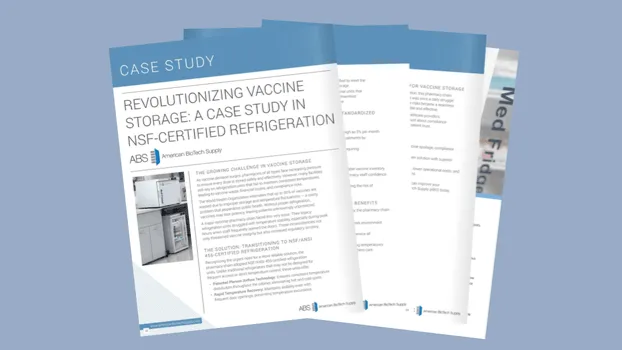THE GROWING CHALLENGE IN VACCINE STORAGE
As vaccine demand surges, pharmacies of all types face increasing pressure to ensure every dose is stored safely and effectively. However, many facilities still rely on refrigeration units that fail to maintain consistent temperatures, leading to vaccine waste, financial losses, and compliance risks.
The World Health Organization estimates that up to 50% of vaccines are wasted due to improper storage and temperature fluctuations — a costly problem that jeopardizes public health. Without proper refrigeration, vaccines may lose potency, leaving patients unknowingly unprotected.
A major national pharmacy chain faced this very issue. Their legacy refrigeration units struggled with temperature stability, especially during peak hours when staff frequently opened the doors. These inconsistencies not only threatened vaccine integrity but also increased regulatory scrutiny.
THE SOLUTION: TRANSITIONING TO NSF/ANSI 456-CERTIFIED REFRIGERATION
Recognizing the urgent need for a more reliable solution, the pharmacy chain adopted NSF/ANSI 456-certified refrigeration units. Unlike traditional refrigerators that may not be designed for frequent access or strict temperature control, these units offer:
• Patented Plenum Airflow Technology: Ensures consistent temperature distribution throughout the cabinet, eliminating hot and cold spots.
• Rapid Temperature Recovery: Maintains stability even with frequent door openings, preventing temperature excursions.
• NSF/ANSI 456 Certification: Independently verified to meet the most rigorous industry standards for vaccine storage.
• Maximized Storage Efficiency: Unlike conventional units that rely on bulky airflow shelves, these refrigerators maximize usable space without compromising performance.
BEFORE & AFTER: THE IMPACT OF STANDARDIZED VACCINE REFRIGERATION
Before upgrading to NSF-certified refrigeration:
• Temperature fluctuations led to spoilage rates as high as 5% per month.
• Frequent excursions required constant manual adjustments by pharmacy staff.
• Regulatory compliance was a persistent concern, requiring extensive documentation.
After the transition:
• Spoilage rates dropped to near-zero, preserving valuable vaccine inventory.
• Temperature excursions were eliminated, giving pharmacy staff confidence in storage conditions.
• Compliance exceeded regulatory requirements, reducing the risk of failed inspections.
BEYOND COMPLIANCE: THE LONG-TERM BENEFITS
In addition to reducing waste and improving vaccine safety, the pharmacy chain discovered several unexpected advantages:
• Quieter Operation: Reduced noise levels enhance the work environment for pharmacy staff.
• Standardized Maintenance: Biomedical staff can now service all refrigeration units efficiently, reducing downtime.
• Improved Workflow: Staff no longer worry about adjusting temperatures or checking for excursions, allowing them to focus on patient care.





